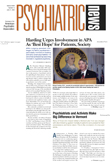As any prison psychiatrist can attest, it’s a tough world behind those bars—not just for inmates but for psychiatrists as well.
Thus, the APA Caucus of Psychiatrists Practicing in Criminal Justice Settings held a workshop at APA’s 2002 annual meeting in Philadelphia last month to give prison psychiatrists an opportunity to share their experiences and to offer suggestions, especially for those new to the field, on how to make life better not just for patients behind bars but for themselves as well. The APA caucus has about 500 members.
Ironically, many prisoners have never had it so good as far as food, shelter, clothing, and safety are concerned, at least in comparison with what they had outside the prison, reported John Zil, M.D., chief forensic psychiatrist at the State of California Department of Corrections.
Nonetheless, a number of inmates have serious mental health problems, Cassandra Newkirk, M.D., chief psychiatrist for the Philadelphia Prison System, pointed out. For instance, many women inmates suffer from depression or posttraumatic stress disorder. In the prison system where Newkirk works, the numbers are 14 percent and 22 percent, respectively. “Many were physically or sexually abused before age 18,” she said.
Abuse in Prison
Juveniles committed to adult prison facilities have also often experienced physical and/or sexual abuse, she continued, and are afraid of being abused even further in prison. “It is also amazing how many males in our facilities were abused as youngsters,” she added.
As for substance abuse, at least 60 percent of all prison inmates have such problems, and 80 percent of those with mental illness also have substance abuse problems, Newkirk noted. Even more women inmates abused substances before entering prison than the men, she pointed out. “Many used drugs to deaden the emotional pain stemming from physical or sexual abuse,” she explained.
The presenters offered suggestions on how to help inmates with psychiatric problems. Annette Hanson, M.D., a forensic psychiatrist at the University of Maryland, said that one way to help inmates with recalcitrant depression was to solicit the assistance of their families.
One way to ease the anxiety of prison patients is to set the date for their next psychiatry visit before leaving them, Henry Weinstein, M.D., a New York City psychiatrist and workshop chair, said. This action gives reassurance that they will not get lost in the system.
Women prison patients generally need to talk about their problems, Newkirk commented, because if women are not able to vent, it can lead to crises.
“I have had inmates tell me, ‘I have to take Valium’ or some other drug because of a court order,” Zil said. Weinstein and Newkirk agreed that that was not an uncommon experience in prison psychiatry. Sometimes judges specify drug treatment with good intentions because they are afraid that inmates will not get necessary medications otherwise, Weinstein added.
Yet judges cannot prescribe psychotropic medications, Zil said. So how to handle such situations? Newkirk told how a judge had once ordered a particular medication for an inmate. When Newkirk called the judge, the judge admitted her mistake. “I would encourage you to call the judges” if you have a question or problem about an order affecting an inmate, Newkirk said. Zil agreed, noting that he has his program manager do it for him to save time.
Avoiding Burnout
Here are some other suggestions from workshop participants on how to make the practice of prison psychiatry more fulfilling:
Prison psychiatry is stressful, and there is a high turnover of psychiatrists in the system, said Zil, who has worked in prison psychiatry since 1975. Even for psychiatrists who have just started working in prisons, it can take its toll, a young psychiatrist who recently began prison work in Rochester, Minn., attested. “It was a shock to take care of these patients,” he said. “It kind of wears you down. Then you are tempted to not engage the patients.”
However, there are some ways to avoid burnout in prison psychiatry, Weinstein said. One is to do this work only part time, not full time. “The world is entirely different when you contract part time,” he explained. But even psychiatrists who work full time in the system can avoid burnout by balancing patient care with teaching, training, and continuing education, he pointed out. “Burnout,” he asserted, “is not just stress and pressure on the job, but also repetition.”
The challenge, Weinstein concluded, is to retain your idealistic spirit and continue savoring those moments where you make a difference. For example, said the young psychiatrist from Rochester, Minn., “I had contact with an inmate who displayed a lot of opposition. Actually, it turned out that he was psychotic, and I was really able to help him. That was very rewarding—that was a slam dunk!” ▪

